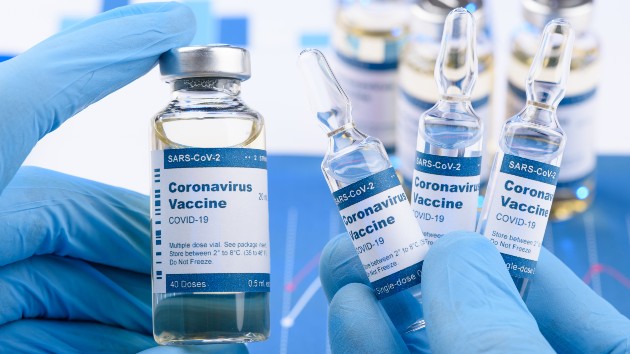By STEPHANIE EBBS and ADISA HARGETT-ROBINSON, ABC News
(NEW YORK) — The Centers for Disease Control and Prevention will recommend adults 75 and older and those in essential roles such as first responders, teachers, farmworkers, prison guards, grocery store workers and public transit employees should be next in line for COVID-19 vaccines, according to recommendations from a CDC advisory committee and accepted by CDC Director Robert Redfield on Monday.The full recommendations will be posted publicly for states, local officials and employers to refer to as they decide who to vaccinate as more doses become available and more people from the first phase, health care workers and residents in nursing homes and long term care facilities, are vaccinated.Exactly when the COVID-19 vaccine will be available to the frontline essential workers will be decided by each state, which can also set their own lists of which people in essential jobs will qualify and how counties or employers should decide who to vaccine first.But it will likely be several more weeks before states start to make the vaccines available to more people. Twenty-four million health care workers and residents and staff at long-term care facilities are eligible to receive the vaccine in the first round. As of Dec. 21 more than 2.8 million doses of the Pfizer and Moderna vaccines had been delivered to states but only 556,208 had been administered, according to CDC data, though officials said there are some delays in reporting data on how many doses have been administered.The advisory group, called the Advisory Committee on Immunization Practices, weighed the people at the highest risk of hospitalization and death from COVID-19 and people that face higher risk of being exposed to the virus that causes COVID-19 through contact with a lot of people through their work.There are about 30 million of those “frontline essential workers” in the country and 21 million people older than 75 that will qualify for the vaccine in the next phase of distribution.When enough supply of vaccines is available to make it available to more people, the CDC committee recommended it be expanded to those between the ages of 65 to 75 and to other groups of people in essential roles such as workers in transportation, food service, construction, finance, IT, media and other public safety officials.Members of the expert panel raised concerns that their priority to get the vaccine to the most vulnerable individuals first could face challenges on the local level, pointing out that the most vulnerable populations are more difficult to reach and that some people could face obstacles like having to take time off without pay to get vaccinated.Helen Keipp Talbot, a professor of medicine at Vanderbilt University, said she has a teenage boy at home who “goes through a gallon of milk a day” and that life in her house would be more difficult without the people processing that milk and getting it to the grocery store.”I feel very strongly that we do need to have that balance of saving lives and keeping our infrastructure in place. It’s easy for us to give vaccine in our clinics, it’s not easy for us to give vaccines to the people on the front lines, for multiple reasons. One is they have to take off time from work to do that, that’s unpaid time that most of them cannot afford because they have to pay their bills,” she said, making a personal appeal to members of Congress that state and local health departments need funding to administer the COVID-19 vaccine.Copyright © 2020, ABC Audio. All rights reserved.












